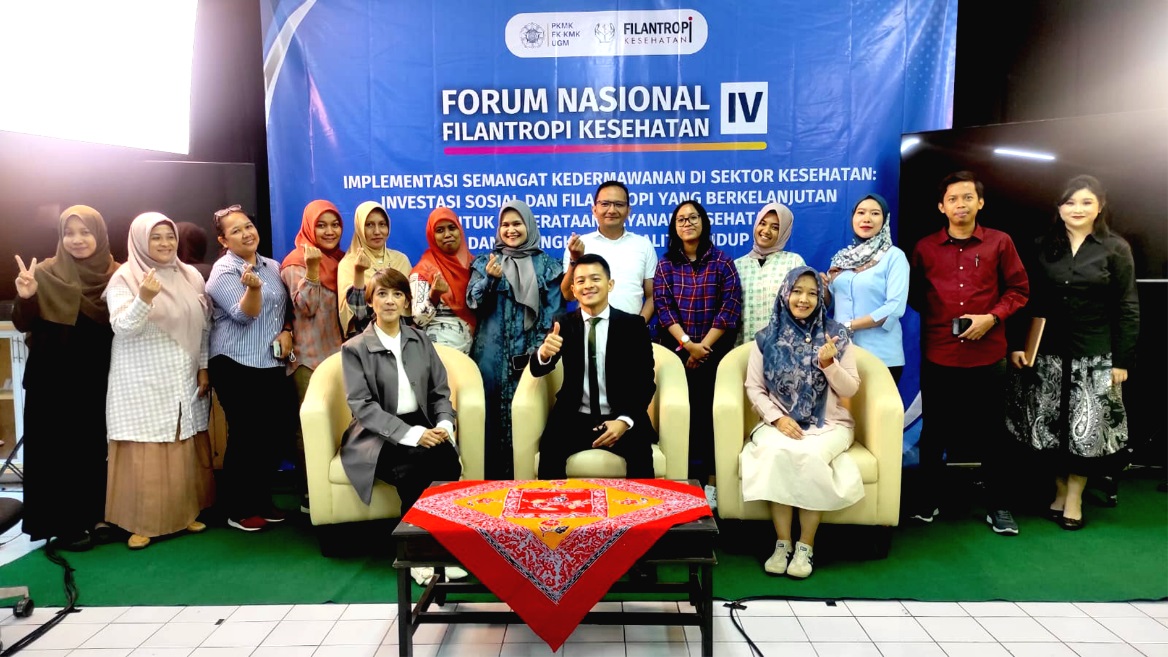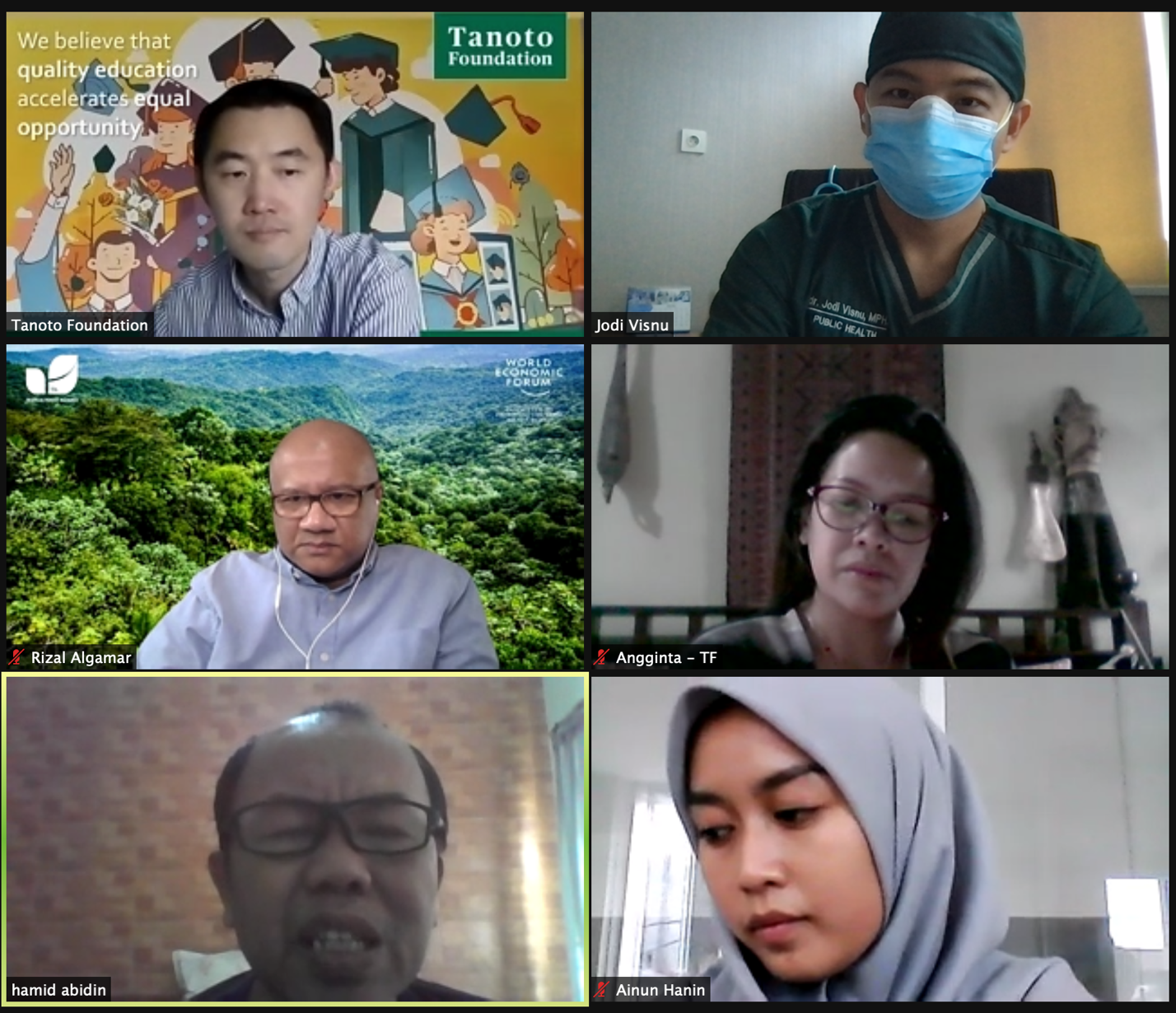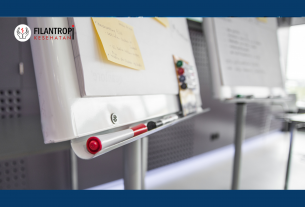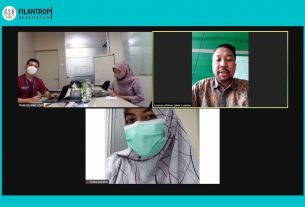BRIEF REPORT
4th National Forum on Health Philanthropy
Implementing the Spirit of Generosity in the Health Sector: Sustainable social investment and philanthropy for equal access to healthcare and improved quality of life
Background
In 2022, Indonesia was once again recognized as the most generous country according to the World Giving Index released by the Charities Aid Foundation, with the highest average score of 68% based on three indicators: helping strangers (58%), donating money (84%), and participating in volunteer activities (63%). This achievement marks the fifth consecutive time in the past five years. It is undeniable that the concept of philanthropy in Indonesia has long been nurtured through the culture of mutual assistance and has often inspired neighboring countries in Southeast Asia such as Singapore, Brunei Darussalam, and Malaysia.
Currently, Indonesia is experiencing a resurgence of development activities as a result of the COVID-19 pandemic, which is transitioning into an endemic phase. Referring back to three years ago when the pandemic first hit, we found that there were significant external assistance from the private sector that were flexible, rapid, and able to reach the most affected areas without going through government bureaucracy. It is evident that the government also needs external support as a complement to its efforts in handling both natural and man-made disasters. This support comes not only in the form of donations from high-net-worth individuals through humanitarian aid, but also from community donations through various crowdfunding platforms, which have been beneficial in helping many parties in facing disasters.
The paradigm of philanthropic decision-making is based on altruism, reciprocal relationships (both transactional and friendship), beneficial publicity for donors, and minimizing losses (in this case, tax deductions). Each donor has their own background in giving donations, whether they are individuals or charitable institutions/organizations. The recipients of donations can vary, either in institutional or individual form, with corresponding action goals. In the field of health, the enthusiasm for philanthropy is increasingly evident throughout Indonesia. It ranges from focusing on complementary healthcare services in hospitals, improving nutrition quality in certain areas, to updating health-supporting technologies such as providing clean water in isolated areas.
Collaboration among various parties is needed to provide comprehensive/holistic healthcare services to the community. It is not only about the mechanism of financing the National Health Insurance (JKN) program, which has been implemented in Indonesia for nine years, but healthcare providers should also continue to innovate to serve every element of society. The government cannot fully cover the various healthcare services and support. In reality, the private sector can complement and contribute without replacing the government’s role in improving public health.
Various innovations in health services were presented and discussed at the 4th National Forum on Health Philanthropy held in a hybrid manner by the Center for Health Policy and Management (PKMK) Faculty of Medicine, Public Health, and Nursing (FK-KMK) Universitas Gadjah Mada (UGM) on October 10-11th, 2023. Broadly speaking, this event aims to explore the role of profit and non-profit organizations in equalizing health philanthropy in Indonesia, identify various health services not covered by the JKN social insurance scheme and require collaboration with private parties, and identify partnership steps that can be undertaken between health philanthropy organizations.
The 4th National Forum on Health Philanthropy brought together 11 speakers with the keynote speaker being the Secretary-General of the Indonesian Ministry of Health, Kunta Wibawa Dasa Nugraha. The panel discussion participants were Trihadi Saptoadi (Tahija Foundation) and Beni Sujanto (General Directorate of Social Empowerment of the Indonesian Ministry of Social Affairs). Other speakers represented academic institutions, philanthropic organizations, and the government to discuss several empirical studies and the implementation of health philanthropy as a social investment for equalizing health services and improving the quality of life of the Indonesian community.
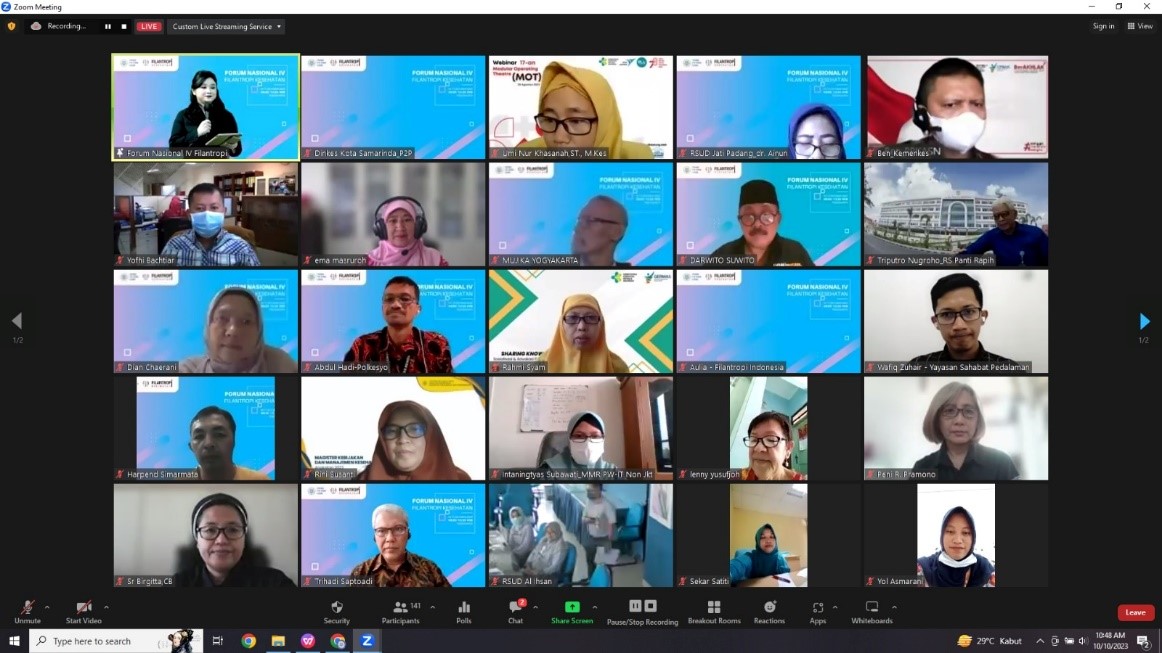
A total of 170 participants from the health philanthropy community of practice, government institutions, policy-makers and organization managers, researchers/ academics, postgraduate students, and media attended via the Zoom Meeting platform, YouTube, and direcly attended at PKMK FK-KMK UGM Yogyakarta. The chief organizer, Jodi Visnu, emphasized the importance of a better understanding of the meaning of generosity in the health sector as a social investment, as well as its benefits in equalizing health services and improving the quality of life for the Indonesian community.
In this event, the close cooperation between the public, private, and non-profit sectors to support the implementation of generosity programs in the health sector was also emphasized. This includes collaboration in financing, resource distribution, and infrastructure strengthening. Also, there is a need for various innovative ideas on health financing using mechanisms of generosity, such as the establishment of social health funds, corporate social responsibility (CSR) programs, and fundraising from the community.
The final emphasis is on significant improvements in the accessibility and quality of health services, especially for vulnerable communities or those in remote areas. This includes improving health infrastructure, training medical personnel and cadres, and public health programs aimed at disease prevention and treatment. Through promotive, preventive, curative, rehabilitative, and palliative efforts that are indispensable, it’s vital to realize that collaboration between institutions can pave the way towards enhancing public health in Indonesia. Through philanthropy, we can create meaningful and real change, merging our resources, knowledge, and expertise to achieve our common goal of a healthy Indonesia.
The 4th National Forum on Health Philanthropy series was followed by 12 paper presentations which were held on October 24-26th, 2023. The presenters were the successful abstract participants who have submitted their research results or creative ideas in the field of health philanthropy. Various presentation themes included child health, youth, elderly, to an emphasis on empowering health cadres, all melting into a discussion forum attended by field practitioners, academics, social activists, and healthcare workers. The presented papers will be processed for inclusion in the proceedings of the 4th National Forum on Health Philanthropy with an ISBN index.
